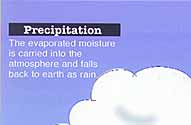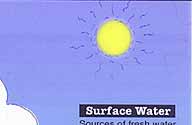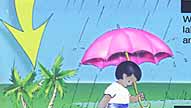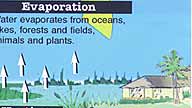 |
|
 |
 |
 |
 |
 |
 |
 |
 |
 |
 |
| Water Cycle Illustration by Barbara Bose / Dry Backgound photo courtesy of the South Florida Water Management District. | |
THE WATER CYCLE
| More
Absolutely Florida About the Drought Silent Springs Water Restrictions Solutions Florida Weather Links |
Once water falls, there are several places it can go. Into lakes and rivers. Into plants. Back up into the atmosphere, either through direct evaporation or plant respiration. This is what happens to about 80 percent of rainfall. Or it can go into the ground - preferably deep into the ground to recharge the Floridan aquifer system, which has been collecting water for millions of years.
Only about 20% of rain makes it this far, said Knowles, who figured out exact percentages for a study he did. Less water from the sky means less water pooling underground. Drought is thought by some to have caused migrations of early humans.
Which brings us to the second part of the drought equation: demand. The aquifer is where most of the state's nearly 16 million people stick their straws when they want a drink. Folks in South Florida depend more on surface water sources. More people equals more demand equals more stress on the resource equals less water, right? Exactly. Development affects both aboveground and underground water supplies and makes a bad situation worse.
"The natural flow of water has been altered," said Rollins College professor R. Bruce Stephenson, summing up the theme of his book, Visions of Eden. The book details the environmental consequences of development in St. Petersburg between 1900 and 1995.
Our environmental legislation grew out of the state's experiences during the last drought, the one in the late '70s, he said. The lesson there was that draining wetlands, which frequently happens when Florida land is developed, has an adverse effect on the water supply. A small example: if a raindrop falls in the forest, it has a better chance of making it into the aquifer than if it falls on pavement. The little raindrop that falls in a subdivision is more likely to become runoff.
MORE